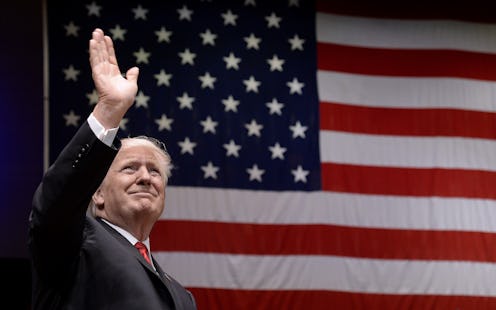News
Trump's Attacks On The Media Are An Attack On My Patriotism

The Fourth of July commemorates the Declaration of Independence, but President Trump's holiday weekend message actually contradicted a different landmark document — the Constitution. On Saturday, Trump attacked the media during a Fourth of July weekend event at the John F. Kennedy Center in Washington, D.C. His criticisms weren't new, but their timing seemed gravely unpatriotic.
"The fake media is trying to silence us, but we will not let them," Trump said to a crowd on Saturday. "The fake media tried to stop us from going to the White House. But I am president, and they're not." Trump's statements were also followed up by a series of harsh anti-media tweets. In one tweet, Trump went so far as to share a photoshopped WrestleMania GIF that showed him physically attacking and beating a figure with the CNN logo for a head. Trump called the major news network "fraud news CNN" in the tweet. For its part, CNN called the tweet "juvenile behavior."
Trump's comments and tweets were just more of the same. His feud with the media began during the early days of his campaign and continued throughout the election cycle, his time as president-elect, and, now, his presidency. What makes this weekend's comments particularly problematic, however, is this obvious juxtaposition: On the most patriotic weekend of the year, Trump chose to elevate his feud with an iconic American institution — the free press — to the point of potentially encouraging physical violence.
The Constitution's First Amendment clearly and explicitly promises the American people a free press. The promise of a free press — along with the freedoms of religion, speech, assembly, and petition — can be found written in textbooks and inscribed on public buildings throughout the country. As a student at the University of North Carolina at Chapel Hill's school of journalism and mass communication (now the school of media and journalism), I walked past a nearly two-stories-tall display of the text each day. That prominence is anecdotal, but it serves to show the passion with which Americans, and particularly journalists, believe in the free press. The amendment reads:
Congress shall make no law respecting an establishment of religion, or prohibiting the free exercise thereof; or abridging the freedom of speech, or of the press; or the right of the people peaceably to assemble, and to petition the government for a redress of grievances.
Many of Trump's predecessors, who each faced their fair share of negative news coverage, see the media's value. Earlier this year, former President George W. Bush said, "I consider the media to be indispensible to democracy." Decades earlier, in 1962, President John F. Kennedy explained the importance of the media — and the tough dynamic that presidents face with it.
There is a terrific disadvantage not having the abrasive quality of the press applied to you daily, to an administration, even though we never like it, and even though we wish they didn't write it, and even though we disapprove, there isn't any doubt that we could not do the job at all in a free society without a very, very active press.
Meanwhile, President Trump seems to think that members of the media are dishonest. His Fourth of July weekend message referenced "the dishonest media," a criticism that other members of his administration have also used. He's not the first president to call the media his enemy — President Nixon reportedly used that term in 1972 — but Trump's incessant attacks, not the least of which include this weekend's tweet of physical violence, appear to reveal an intent to delegitmize an institution that separates the United States from the many non-democratic countries around the world.
Back to my anecdotal, but relevant, experience for a moment: In journalism school, I learned to interview sources, find a story, and above all else, to tell the truth. As reporter Brian Karem implied last week during his exchange with Deputy Press Secretary Sarah Huckabee Sanders, a journalist's credibility hinges on honesty. "Any one of us are replaceable, and any one of us, if we don’t get it right, the audience has the opportunity to turn the channel or not read us," Karem said. In the United States, the press is free to comment on government affairs, but it is still accountable to the American free market. If a journalist is caught lying or fabricating stories, his or her job is almost surely gone.
Trump's attacks on the media don't just discredit a fundamental part of American culture, but they also detract from his work as president. The purpose of Trump's Saturday speech in Washington, D.C. was to honor veterans. "We will always take care of our great veterans," Trump said. "You have shed your blood, poured your love, and bared your soul, in defense of our country." That's a message any freedom-loving American can support, particularly during Fourth of July celebrations. Unfortunately, the president's important support for veterans and servicemembers was overshadowed by his undemocratic attacks on the free press.
He is my president, but his patriotism is not my patriotism. This weekend, the president used the most patriotic holiday of the year to discredit a fundamental part of American democracy. Trump's ongoing attacks on the media ignore the time, energy, and studies that American journalists put into their profession; overshadow the real issues he seeks to affect; and contradict the Constitution.